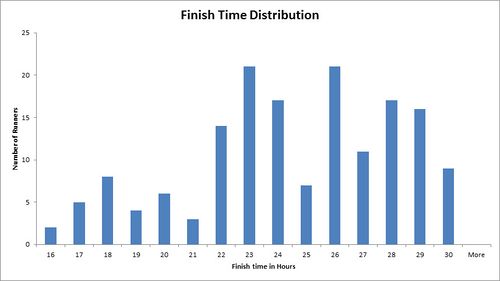2013 Umstead 100
For the 2013 Umstead race I was planning on running 5 laps (62 miles), working the aid station for 10 hours, and then finishing off the last 3 laps for the full 100. I ran the first 2 laps at an easy pace, which worked out at 2 hours each. I figured I needed to slow down to be in shape for running in the morning, so I added in more Walking Breaks and did the next two laps in 2:15 each. My final lap was much slower, mostly because I found a disabled runner and stayed with them while a vehicle came to pick them up. I then worked the aid station through the night, fixing people's blisters. I knew that I'd need to head out by 5am at the very latest to have a reasonable chance of finishing by the noon cutoff, but I chose not to for several reasons.
- I was still getting a trickle of runners in with blister problems and I didn't want to abandon them. (Last year I fixed my last blister just before 8am.)
- My legs stiff and sore, so I'd be quite a bit slower than I was at the start.
- The normal cutoff for the last lap is 8am. I knew I could get a pass on this due to my circumstances, but I'd likely be heading out for my last lap between 9am and 10am, by which time the aid on the course would be being dismantled. Running that last lap with limited aid as the day warmed up would be unpleasant at best.
- My left Achilles tendon was inflamed. This was not a serious problem, but trying to run 37 miles on it may exacerbate things.
Next year my plan is to focus on running a fast 50 miler and then working the aid station. I believe it is possible to run the 100 and volunteer, but it would be a major effort. I'd rather put that level of effort into a straight 100 mile race.
Contents
1 What Worked
As always, I like to write up thing that worked and didn't work, both to help me remember and to share with other runners.
- Nausea. I had no nausea, which is great. I didn't run far or hard, but it's still nice that there were no problems. I did have slight nausea when I got too hot working too close to the fire they have burning, but that's not surprising.
- The usual gear. All my usual gear worked well, including Go Juice, Under Armor Heat Gear Top, Race Ready Shorts, MP3 player, Garmin 310XT, etc., all performed flawlessly.
- Hokas. My Hokas did well, though I had the upper tear on my previous pair, so I had to order a replacement pair this week. Running in shoes that only had 15 miles on them was not idea, but it seemed to work out.
- Antioxidants. I tried vitamin C and E and this might have helped. I had remarkably little DOMS after the race, but I'd taken it slower than normal so it's hard to be sure. (I took 250mg of Vitamin C and 400 IU of Vitamin E after each lap, with 500mg/400IU before the race. I routinely take 500mg+400IU twice a day.)
2 What Didn't Work
Overall, there was nothing that went wrong on my race at all other than not having a sane plan. I should probably have done more heat acclimation, plus I need to lose some weight and restart my altitude training. However, I was not planning on a competitive race, so none of that was a problem.
3 Fixing Blisters
I fixed numerous blisters during the night, and generally things went remarkably well. The weather was kind to us, with no rain, which reduced the number of blisters. Here are some of my notes from the night:
- I used a reclining "zero gravity" chair which worked wonderfully. It allowed me to raise the runners' feet so I could work on them without crawling on the floor. More importantly, the shape kept their hips and knees gently bent which prevented them cramping. Next time I may put a blanket on the chair below the runner to keep them warmer.
- There were more people running in Hoka shoes, and I found a distinct pattern of blisters that was occurring due to the tight toe box. I'll write up some notes on my blister prevention page soon.
- The race had a separate cabin set up for runners who had finished the race, making things much more manageable in the medical area.
- I was not set up or prepared for post-race dressings. Intact blisters are easy as you tell folks to leave them alone, but for open wounds probably need dressing.
- I'd like to get a better understanding what's working and what's not for different types of blister, so I may setup a feedback mechanism.
